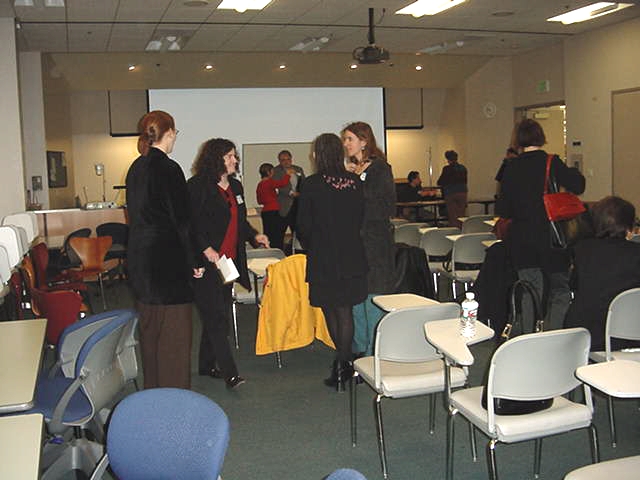
Kendra Van Cleeve, Lynn Lampert, Sarah McDaniel

Panelists: Sarah McDaniel* (USC), Deborah Moore* (Glendale Community College), Kendra Van Cleave (USC)
* Denotes Panel Facilitators.
Sarah McDaniel opened the session by recognizing that having a successful instruction program means different things. Success may mean having librarians that are enthusiastic, well trained, and visible on campus. It may also be offering a for-credit course on library research. Whatever success means to you, Sarah, Deborah, and Kendra hoped to address the question — how do you continue to satisfy your audience when demand goes up, but staffing levels remain the same?
Deborah Moore shared her experiences at Glendale Community College (GCC), where she has served as an Instructional/Reference Librarian since July 2001. GCC serves some 25,000 students overall, with 17,000 being credit students. The library has four full time librarians and is fortunate to have one full time temporary librarian that helps Deborah with instruction. When she started at GCC, the library had a good instruction program in place, which offered six workshops several times throughout the semester, accommodated requests for special classes, and included a one-unit course, Library 191 — Introduction to Information Literacy.
GCC’s great "success" began in Fall 2001, when sixty students started signing up for each workshop. Deborah attributed this success to GCC’s compressed calendar, which gave the college a shorter amount of time to provide the same level of service. Another cause of this success was that more faculty began requiring that their students attend the workshops.
Thanks to having a good structure in place, Deborah and her colleagues have managed the increasing attendance quite well. To keep things running smoothly, Deborah also
At the University of Southern California (USC), the instruction program is a decentralized success. Sarah MaDaniel coordinates instruction campus wide, Kendra Van Cleave works with Sarah to focus on and improve instruction in USC's numerous subject libraries.
For Sarah, it was important to improve communication across the instruction librarians as well as with the administrators. She wanted to determine their services, goals, and accomplishments. Knowing this information would help her better provide instruction to the Writing Program, where she is fortunate to see the students during their freshman and junior years.
Kendra highlighted the experiences in the subject libraries, where instruction takes a very decentralized form. There is no clear assignment of instruction, so that it is not known whether selectors or public service librarians should be teaching the classes. Scheduling classes depends upon independent contact between librarians and faculty, which means some groups receive no instruction at all.
With a goal of centralizing USC libraries’ instruction, Sarah sent out a survey to all units and learned that they all had increasing volumes of bibliographic instruction. Despite its success, instruction was overlooked in long-term planning, usually being overshadowed by reference, collection development, and other traditional library activities. Since a solid bibliographic instruction program should be a campus-wide goal, Sarah initiated an Instruction Task Force. This task force determined that the Writing Program is the priority, even if it meant that subject instruction could not immediately grow. As a result, a Writing Instruction Team consisting of four undergraduate and three subject librarians was established. At the same time, instruction coordinators were appointed to each subject unit to ensure that their instruction continued as smoothly as possible given the new priorities.
The 2001-2002 academic year was the first year that USC has pulled in subject librarians to assist with the Writing Program, so Sarah and Kendra are still seeing how the program develops. They have learned already that getting buy-in from librarians and their supervisors has been tricky because focusing priorities on the Writing Program can take time away from other duties. Also, the subject librarians that participate in the Writing Instruction Team have not been able to solicit new instruction sessions for their subject classes. However, Sarah and Kendra have succeeded in getting better communication across all of the instruction librarians. They have also streamlined their referral process and expanded their collection of statistics.
Submitted by Emily R. Woolery, ewoolery@mtsac.edu, Mt. San Antonio College Library; with modifications by Deborah Moore.